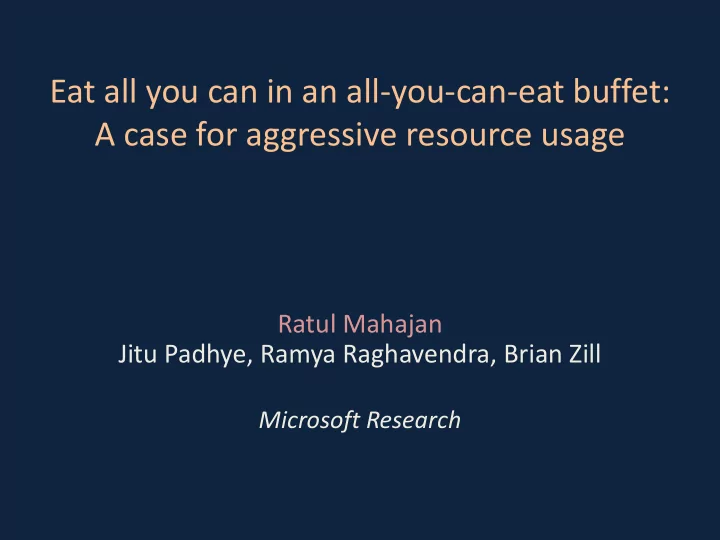

Eat all you can in an all-you-can-eat buffet: A case for aggressive resource usage Ratul Mahajan Jitu Padhye, Ramya Raghavendra, Brian Zill Microsoft Research
Avoiding hunger Alice walks into a restaurant How much to eat to minimize the chance of getting hungry before the next meal? 1. As much as stomach space allows; or 2. Based on expected time until next meal ratul | hotnets | 2008 2
Avoiding packet loss Bob needs to transmit data over a noisy wireless channel How much FEC to add to minimize the chance of losing packets? 1. As much as the available spectrum; or 2. Based on expected bit error rate ratul | hotnets | 2008 3
The focus on efficiency in current designs Operating at the sweet spot tends to be the goal • Low efficiency beyond it Inappropriate in many scenarios • If the resource is of “use it or lose it” kind • If the sweet spot is hard to determine ratul | hotnets | 2008 4
The Buffet principle Continue using more resources as long as the Continue using more resources as long as the marginal cost can be driven marginal cost can be driven lower than the marginal benefit lower than the marginal benefit Key strength: performance limited by available resources, not artificial design choices Key challenge: the default way to aggressively use resources is often problematic ratul | hotnets | 2008 5
Case: Adding FEC to data transmissions Current practice: # of FEC bits is independent of load and available spectrum Buffet: aggressively use available spectrum for FEC bits Simulation results with 1000-byte packets, 1 Mbps channel, 10 -6 BER ratul | hotnets | 2008 6
Making Buffet FEC practical Greedy addition of FEC can hurt with multiple transmitters • Especially for CSMA systems (e.g., WiFi) Possible solution [under development] a) Embed bits in separate packets b) Send at low priority Data FEC c) Keep FEC packets small Low priority FEC ratul | hotnets | 2008 7
Case: Erasure coding for lossy paths Current practice: balance # of coded packets and bandwidth cost Buffet: aggressively uses all available capacity Managing the impact of aggressive redundancy • Use priority on packets if router support is available • Transmit only when queue is empty [under development] ratul | hotnets | 2008 8
More case studies Mobility updates in ad hoc networks • Must balance freshness of info and bw overhead • Buffet: Aggressively send updates per spare capacity • Prioritization can minimize impact on data transfers Routing in delay-tolerant networks (DTNs) • Must balance message delivery prob. and fairness • Recent design (RAPID) uses the Buffet principle • A utility-driven framework prevents disproportionate resource usage by some messages ratul | hotnets | 2008 9
Yet more case studies Using replication to boost reliability • Across disks within a computer o Use background tasks to manage overhead • Across multiple computers o Use background transfers to manage overhead Pre-loading binaries into memory Pre-fetching Web pages into caches Speculative execution of program branches ratul | hotnets | 2008 10
Considerations in applying the Buffet principle What are the challenges? What resources does it apply to (naturally)? What are the side-effects? ratul | hotnets | 2008 11
Challenges in applying the principle Aggressive resource usage should not detract from productive work • Helpful techniques: explicit or implicit priorities; opportunistic usage; and utility-driven usage Quantifying the marginal cost and benefit • Must include the impact of side-effects as well • Precise accounting not needed in many situations ratul | hotnets | 2008 12
Applicable resources More natural for non-conservable resources • E.g., storage, bandwidth, computation • Feasible for others as well (e.g., battery) Easier when the resource is not shared with non-Buffet users ratul | hotnets | 2008 13
Side-effects of aggressive resource use New bottlenecks or concerns • E.g., disk I/O bw, energy consumption Increased hardware wear-and-tear Task completion latency may increase Performance is now coupled with load ratul | hotnets | 2008 14
Conclusions Continue using more resources as long as the marginal cost can be driven lower than the marginal benefit The Buffet principle advocates aggressive resource usage instead of a singular focus on efficiency It has the potential to provide the best performance for the level of available resources ratul | hotnets | 2008 15
Recommend
More recommend